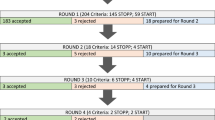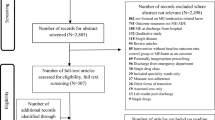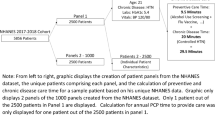Abstract
Objectives
To evaluate the overall rate of adherence by general practitioners (GPs) to treatment modifications suggested at discharge from hospital and to assess the way communication between secondary and primary care could be improved.
Design
Observational prospective cohort study.
Setting
Patients hospitalized from the emergency department to the acute geriatric care unit of a university hospital.
Participants
206 subjects with a mean age of 85 years.
Measurements
Changes in drug regimen undertaken during hospitalization were collected with the associated justifications. Adherence at one month by GPs to treatment modifications was assessed as well as modifications implemented in primary care with their rationale in case of non-adherence. Community pharmacists’ and GPs’ opinions about quality of communication and information transfer at hospital-general practice interface were investigated.
Results
5.5 ± 2.8 drug regimen changes were done per patient during hospitalization. The rate of adherence by GPs to treatment modifications suggested at discharge from hospital was 83%. In most cases, non-adherence by GPs to treatment modifications done during hospitalization was due to dosage adjustments, symptoms resolution but also worsening of symptoms. The last of which was particularly true for psychotropic drugs. All GPs received their patients’ discharge letters but the timely dissemination still needs to be improved. Only 6.6% of community pharmacists were informed of treatment modifications done during their patients’ hospitalization.
Conclusion
Our findings showed a successful rate of adherence by GPs to treatment modifications suggested at discharge from hospital, due to the fact that optimization was done in a collaborative way between geriatricians and hospital pharmacists and that justifications for drug regimen changes were systematically provided in discharge letters. Communication processes at the interface between secondary and primary care, particularly with community pharmacists, must be strengthened to improve seamless care.
Similar content being viewed by others
References
Spinewine A, Schmader KE, Barber N, Hughes C, Lapane KL, Swine C, et al. Appropriate prescribing in elderly people: how well can it be measured and optimised? Lancet Lond Engl. 2007 Jul 14;370(9582):173–84.
Cornish PL, Knowles SR, Marchesano R, Tam V, Shadowitz S, Juurlink DN, et al. Unintended medication discrepancies at the time of hospital admission. Arch Intern Med. 2005 Feb 28;165(4):424–9.
Vira T, Colquhoun M, Etchells E. Reconcilable differences: correcting medication errors at hospital admission and discharge. Qual Saf Health Care. 2006 Apr;15(2):122–6.
Coleman EA, Smith JD, Raha D, Min S. Posthospital medication discrepancies: prevalence and contributing factors. Arch Intern Med. 2005 Sep 12;165(16):1842–7.
Forster AJ, Clark HD, Menard A, Dupuis N, Chernish R, Chandok N, et al. Adverse events among medical patients after discharge from hospital. CMAJ Can Med Assoc J J Assoc Medicale Can. 2004 Feb 3;170(3):345–9.
Institute of Medicine Retooling for an Aging America: Building the Health Care Workforce. Washington, DC: The National Academies Press, 2008.
Viktil KK, Blix HS, Eek AK, Davies MN, Moger TA, Reikvam A. How are drug regimen changes during hospitalisation handled after discharge: a cohort study. BMJ Open. 2012;2(6).
Cool C, Cestac P, Laborde C, Lebaudy C, Rouch L, Lepage B, et al. Potentially inappropriate drug prescribing and associated factors in nursing homes. J Am Med Dir Assoc. 2014;15(11):850.e1-9.
Récoché I, Lebaudy C, Cool C, Sourdet S, Piau A, Lapeyre-Mestre M, et al. Potentially inappropriate prescribing in a population of frail elderly people. Int J Clin Pharm. 2016 Dec 10
Laroche M-L, Charmes J-P, Merle L. Potentially inappropriate medications in the elderly: a French consensus panel list. Eur J Clin Pharmacol. 2007 Aug;63(8):725–31.
Gallagher P, Ryan C, Byrne S, Kennedy J, O’Mahony D. STOPP (Screening Tool of Older Person’s Prescriptions) and START (Screening Tool to Alert doctors to Right Treatment). Consensus validation. Int J Clin Pharmacol Ther. 2008 Feb;46(2):72–83.
Allenet B, Bedouch P, Rose F-X, Escofier L, Roubille R, Charpiat B, et al. Validation of an instrument for the documentation of clinical pharmacists’ interventions. Pharm World Sci PWS. 2006 Aug;28(4):181–8.
Haute Autorité de Santé. Recommandations de bonne pratique clinique chez les sujets âgés. Available from: http://www.has-sante.fr/portail/jcms/c_39085/fr/recherche?portlet=c_39085&text=personnes+ag%C3%A9es&opSearch=&lang=fr
Kruse W, Rampmaier J, Frauenrath-Volkers C, Volkert D, Wankmüller I, Micol W, et al. Drug-prescribing patterns in old age. A study of the impact of hospitalization on drug prescriptions and follow-up survey in patients 75 years and older. Eur J Clin Pharmacol. 1991;41(5):441–7.
Grimmsmann T, Schwabe U, Himmel W. The influence of hospitalisation on drug prescription in primary care—a large-scale follow-up study. Eur J Clin Pharmacol. 2007 Aug;63(8):783–90.
Himmel W, Kochen MM, Sorns U, Hummers-Pradier E. Drug changes at the interface between primary and secondary care. Int J Clin Pharmacol Ther. 2004 Feb;42(2):103–9.
Hayes BD, Klein-Schwartz W, Barrueto F. Polypharmacy and the geriatric patient. Clin Geriatr Med. 2007 May;23(2):371–390, vii.
Autier P, Boniol M, Pizot C, Mullie P. Vitamin D status and ill health: a systematic review. Lancet Diabetes Endocrinol. 2014 Jan;2(1):76–89.
Sheen E, Triadafilopoulos G. Adverse effects of long-term proton pump inhibitor therapy. Dig Dis Sci. 2011 Apr;56(4):931–50.
Schäfers A, Martini N, Moyes S, Hayman K, Zolezzi M, McLean C, et al. Medication use in community-dwelling older people: pharmacoepidemiology of psychotropic utilisation. J Prim Health Care. 2014 Dec;6(4):269–78.
Sinclair A, Morley JE, Rodriguez-Mañas L, Paolisso G, Bayer T, Zeyfang A, et al. Diabetes mellitus in older people: position statement on behalf of the International Association of Gerontology and Geriatrics (IAGG), the European Diabetes Working Party for Older People (EDWPOP), and the International Task Force of Experts in Diabetes. J Am Med Dir Assoc. 2012 Jul;13(6):497–502.
Renom-Guiteras A, Meyer G, Thürmann PA. The EU(7)-PIM list: a list of potentially inappropriate medications for older people consented by experts from seven European countries. Eur J Clin Pharmacol. 2015 Jul;71(7):861–75.
Hogan DB. Long-term efficacy and toxicity of cholinesterase inhibitors in the treatment of Alzheimer disease. Can J Psychiatry Rev Can Psychiatr. 2014 Dec;59(12):618–23.
Société Française d’Hypertension Artérielle. Prise en charge de l’hypertension artérielle de l’adulte. Recommandations [Internet]. 2013 [cited 2016 Sep 22]. Available from: http://www.sfhta.eu/wp-content/uploads/2012/12/Recommandation-SFHTA-2013-Prise-en-charge-HTA-de-lAdulte.pdf
Zermansky AG, Alldred DP, Petty DR, Raynor DK, Freemantle N, Eastaugh J, et al. Clinical medication review by a pharmacist of elderly people living in care homes— randomised controlled trial. Age Ageing. 2006 Nov;35(6):586–91.
Haute Autorité de Santé. Arrêt des benzodiazépines et médicaments apparentés: démarche du médecin traitant en ambulatoire. [Internet]. 2015 [cited 2016 Sep 25]. Available from: http://www.has-sante.fr/portail/upload/docs/application/pdf/2015-06/fiche_memo_arret_benzodiazepines_pour_mel_2015_06_16.pdf
Vega A. Le partage des responsabilités en médecine. Une approche socioanthropologique des pratiques soignantes. [Internet]. 2011 [cited 2016 Sep 25]. Available from: http://www.formindep.org/IMG/pdf/rapport_final3.pdf
Clerc P, Le Breton J, Mousquès J, Hebbrecht G, De Pouvourville G. Les enjeux du traitement médicamenteux des patients atteints de polypathologies. Résultats de l’étude expérimentale Polychrome. 2010 Juillet-août;156.
Urban R, Paloumpi E, Rana N, Morgan J. Communicating medication changes to community pharmacy post-discharge: the good, the bad, and the improvements. Int J Clin Pharm. 2013 Oct;35(5):813–20.
Bolas H, Brookes K, Scott M, McElnay J. Evaluation of a hospital-based community liaison pharmacy service in Northern Ireland. Pharm World Sci PWS. 2004 Apr;26(2):114–20.
Brookes K, Scott MG, McConnell JB. The benefits of a hospital based community services liaison pharmacist. Pharm World Sci PWS. 2000 Apr;22(2):33–8.
Munday A, Kelly B, Forrester JW, Timoney A, McGovern E. Do general practitioners and community pharmacists want information on the reasons for drug therapy changes implemented by secondary care? Br J Gen Pract J R Coll Gen Pract. 1997 Sep;47(422):563–6.
Author information
Authors and Affiliations
Corresponding author
Rights and permissions
About this article
Cite this article
Rouch, L., Farbos, F., Cool, C. et al. Hospitalization Drug Regimen Changes in Geriatric Patients and Adherence to Modifications by General Practitioners in Primary Care. J Nutr Health Aging 22, 328–334 (2018). https://doi.org/10.1007/s12603-017-0940-1
Received:
Accepted:
Published:
Issue Date:
DOI: https://doi.org/10.1007/s12603-017-0940-1




